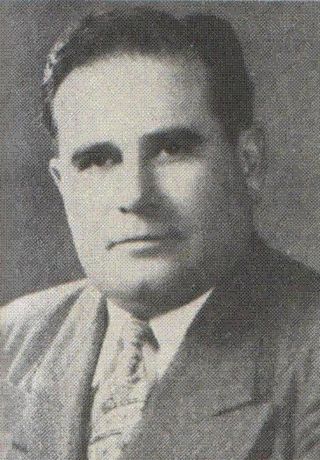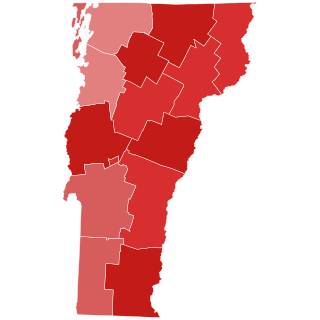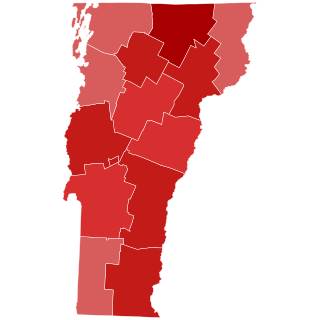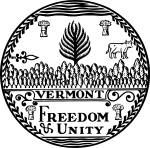
Harold John Arthur was the 68th governor of Vermont from 1950 to 1951. He also served as the 64th lieutenant governor of Vermont from 1949 to 1950.

Ernest William Gibson Jr. was an American attorney, politician, and judge. He served briefly as an appointed United States Senator, as the 67th governor of Vermont, and as a federal judge.

The Vermont Senate is the upper house of the Vermont General Assembly, the state legislature of the U.S. state of Vermont. The senate consists of 30 members elected from multi-member districts. Each senator represents at least 20,300 citizens. Senators are elected to two-year terms and there is no limit to the number of terms that a senator may serve.

Mortimer Robinson Proctor, known as Mortimer R. Proctor, was an American politician from Vermont. He served as the 62nd lieutenant governor of Vermont from 1941 to 1945, and as the 66th governor of Vermont from 1945 to 1947.
The politics of Vermont encompass the acts of the elected legislative bodies of the US state, the actions of its governors, as overseen by the Vermont courts, and the acts of the political parties that vie for elective power within the state. The state's politics include local Democratic and Republican political parties, as well as several smaller parties.

The 1950 Vermont gubernatorial election took place on November 7, 1950. Incumbent Republican Harold J. Arthur, who had become governor following the resignation of Ernest W. Gibson Jr., did not run for a full term as Governor of Vermont. Republican candidate Lee E. Emerson defeated Democratic candidate J. Edward Moran and succeeded Arthur.

The 1946 Vermont gubernatorial election took place on November 5, 1946. Incumbent Republican Mortimer R. Proctor ran unsuccessfully for re-election to a second term as Governor of Vermont, losing to Ernest W. Gibson, Jr. in the Republican primary. Gibson defeated Democratic candidate Berthold C. Coburn in the general election.

The 1942 Vermont gubernatorial election took place on November 3, 1942. Incumbent Republican William H. Wills ran successfully for re-election to a second term as Governor of Vermont, defeating Democratic candidate Park H. Pollard.

The 1940 Vermont gubernatorial election took place on November 5, 1940. Incumbent Republican George Aiken did not run for re-election to a third term as Governor of Vermont, instead running for the United States Senate. Republican candidate William H. Wills defeated Democratic candidate John McGrath to succeed him.

The 1936 Vermont gubernatorial election took place on November 3, 1936. Incumbent Republican Charles M. Smith did not run for re-election to a second term as Governor of Vermont. Republican candidate George Aiken defeated Democratic candidate Alfred H. Heininger to succeed him.

The 1930 Vermont gubernatorial election took place on November 4, 1930. Incumbent Republican John E. Weeks did not run for re-election to a third term as Governor of Vermont. Republican candidate Stanley C. Wilson defeated Democratic candidate Park H. Pollard to succeed him.

The 1924 Vermont gubernatorial election took place on November 4, 1924. Incumbent Republican Redfield Proctor Jr., per the "Mountain Rule", did not run for re-election to a second term as Governor of Vermont. Republican candidate Franklin S. Billings defeated Democratic candidate Fred C. Martin to succeed him.

The 1922 Vermont gubernatorial election took place on November 7, 1922. Incumbent Republican James Hartness, per the "Mountain Rule", did not run for re-election to a second term as Governor of Vermont. Republican candidate Redfield Proctor Jr. defeated Democratic candidate John Holmes Jackson to succeed him.

The 1908 Vermont gubernatorial election took place on September 1, 1908. Incumbent Republican Fletcher D. Proctor, per the "Mountain Rule", did not run for re-election to a second term as Governor of Vermont. Republican candidate George H. Prouty defeated Democratic candidate, Burlington mayor James Edmund Burke to succeed him.

The 1906 Vermont gubernatorial election took place on September 4, 1906. In keeping with the Republican Party's "Mountain Rule", incumbent Republican Charles J. Bell, did not run for a second term as Governor of Vermont. At the start of the year, Percival W. Clement and Fletcher D. Proctor were the leading candidates for the Republican nomination. When it became clear that Proctor had the support of the delegates, Clement ended his campaign for the nomination. He filed as an Independent candidate for the general election and was subsequently endorsed by the Democratic Party. In the general election, Proctor easily defeated Clement.

The 1880 Vermont gubernatorial election took place on September 7, 1880. Incumbent Republican Redfield Proctor, per the "Mountain Rule", did not run for re-election to a second term as Governor of Vermont. Republican candidate Roswell Farnham defeated Democratic candidate Edward J. Phelps to succeed him.

The 1878 Vermont gubernatorial election took place on September 3, 1878. Incumbent Republican Horace Fairbanks, per the "Mountain Rule", did not run for re-election to a second term as Governor of Vermont. Republican candidate Redfield Proctor defeated Democratic candidate W. H. H. Bingham to succeed him.

The 1940 United States Senate special election in Vermont took place on November 5, 1940. Republican George Aiken was elected to the United States Senate to serve the remainder of the deceased Ernest W. Gibson, Sr.'s term, defeating Democratic candidate Herbert B. Comings. Aiken replaced Gibson's son, Ernest W. Gibson, Jr., who was appointed to fill the seat until a special election could be held.
George H. Amidon was a Vermont businessman and state official. He was most notable for his service as state commissioner of taxes from 1945 to 1949 and Vermont State Treasurer from 1949 to 1965.
















